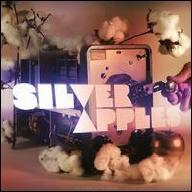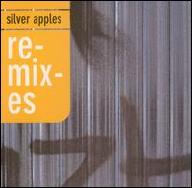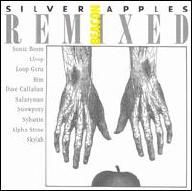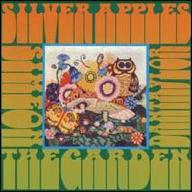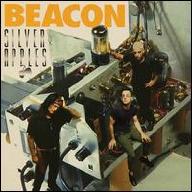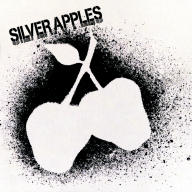Prior to forming the Silver Apples, vocalist Simeon Coxe and percussionist Danny Taylor played in a more traditional-sounding '60s rock group, the Overland Stage Electric Band. However, Coxe's addition of a 1940s audio oscillator to the band alienated the other members so much that ultimately he and Taylor were the only ones left, and they began making music as the Silver Apples in New York City in 1967. Coxe added more and more oscillators, incorporating them into an instrument called the Simeon that (according to notes on the duo's self-titled 1968 debut LP) consisted of "nine audio oscillators and eighty-six manual controls...The lead and rhythm oscillators are played with the hands, elbows and knees and the bass oscillators are played with the feet." Coxe and Taylor also connected with budding poet Stanley Warren, who wrote lyrics for many of their early songs, including their signature track, "Oscillations."
The duo released The Silver Apples via Kapp Records, and although the utterly uncommercial record -- an ingenious cacophony of beeps, buzzes, and beats -- sold poorly, the Silver Apples resurfaced in 1969 with their sophomore effort, Contact, and toured the United States. The album's artwork featured Coxe and Taylor manning the cockpit of a Pan Am jet on the front cover, and a picture of a European plane crash with the duo superimposed over it on the back. The airline sued Kapp and the band, Contact was pulled from record store shelves, and Taylor's drums were confiscated. The Silver Apples' third album, The Garden, was shelved, and the group disbanded in 1970; Coxe then worked as a graphic designer, while Taylor worked for a telephone company.
It seemed the Silver Apples had disappeared completely until 1994, when a German bootleg of The Silver Apples and Contact sparked new interest in the band. Two years later, Coxe re-formed the Silver Apples; unable to find Taylor, he drafted keyboardist Xian Hawkins (also of Sybarite) and drummer Michael Lerner. This version of the band toured America and Europe and released a new album, 1998's Steve Albini-recorded Beacon. Coxe and Taylor were finally reunited after Taylor heard the Silver Apples' music on New Jersey public radio station WFMU, and the duo fleshed out the original recordings of The Garden for release that year. Another album of new material, Decatur, also arrived in 1998 and featured Lerner on drums. Coxe and Taylor also played a handful of live dates, but in November 1998 the band's van crashed on the way back from a show in New York, leaving Coxe with neck and spine injuries. During his years of recovery, he taught himself how to play the Simeon again. Meanwhile, the Spectrum collaboration A Lake of Teardrops was released in 1999; the following year, a joint effort with U.K. psych/noise outfit the Alchemysts appeared.
Though Taylor died from cancer in 2005, Coxe had enough recordings of his drumming to sample them for live performances and new music. Starting in 2007, Coxe toured consistently, playing at experimental music festivals including 2011's All Tomorrow's Parties I'll Be Your Mirror in Asbury Park, New Jersey, where he collaborated with Cluster's Hans-Joachim Roedelius as Silver-Qluster one day, and shared the stage with Portishead on their Silver Apples homage "We Carry On" the next. Coxe continued making music in his home studio in Alabama, working with singer/songwriter Lydia LaVert as Amphibian Lark and as Silver Apples. The project's first album in nearly 20 years, 2016's Clinging to a Dream, featured songs from an opera Coxe wrote about a society of invisible vegetarian vampires as well as production by Bark Psychosis' Graham Sutton. The Silver Apples also appeared on the Dymaxion Groove compilation I Said No Doctors, which included tracks from Dan Deacon, Jad Fair, and David Grubbs. Simeon Coxe died on September 8, 2020 at the age of 82. ~ Jason Ankeny & Heather Phares, Rovi
|
1
|
|
Lovefingers |
|
2
|
|
Oscillations |
|
3
|
|
Program |


